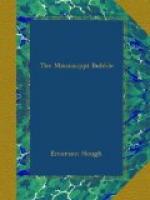Philippe of Orleans could not see why, since credit based on specie made possible a great volume of accepted notes, a credit based on all France might not warrant an indefinite issue of such notes. He offered his director-general all the concessions which the crown could give, all the revenue-producing elements of France—in effect, all France itself, as security. In return he asked but the small privilege of printing for himself as much money as he chose and whenever he saw fit!
The notes of the private bank of Law were an absolute promise to pay a certain and definite sum, not a changeable or indefinite sum; and Law made it a part of his published creed that any banker was worthy of death who issued notes without having the specie wherewith to pay them. He insisted that the payment should mean specie in the value of the day on which the note was issued. This item the regent liked little, as being too irksome for his temper. Was it not of record how Louis, the Grand Monarque, had twice made certain millions for himself by the simple process of changing the value of the coin? Dicing, drinking, amorous Philippe, easy-going, shallow-thinking, truly wert thou better fitted for a throne than for a banker’s chair!
The royal bank, which the regent himself hastened to foster when he saw the profits of the first private bank of circulation and discount France had ever known, issued notes against which Law entered immediately his firm protest. He saw that their tenor spelled ruin for the whole system of finance which, at such labor, he had erected. These notes promised to pay, for instance, fifty livres “in silver coin,” not “in coin of the weight and standard of this day,” as had the honester notes of Law’s bank. That is to say, the notes meant nothing sure and nothing definite. They might be money for a time, but not forever; and this the director-general was too shrewd a man not to know.
“But under this issue you shall have all France,” said the regent to him one day, as they renewed their discussion yet again upon this scheme. “You shall have the farming of the taxes. I will give you all the foreign trade as monopoly, if you like—will give you the mint—will give you, in effect, as I have said, all France. But, Monsieur my director-general, I must have money. It is for that purpose that I appoint you director-general—because I find you the most remarkable man in all the world.”
“Your Grace,” said Law, “print your notes thus, and print them to such extent as you wish, and France is again worse than bankrupt! Then, indeed, you have worse than repudiated the debts of France.”
“Ah bah! mon drole! You are ill to-day. You have a migraine, perhaps? What folly for you to speak thus. France hath swiftly grown so strong that she can never again be ruined. What ails my magician, my Prince of Golconda, this morning? France bankrupt! Even were it so, does that relieve me of this begging of De Prie, of Parabere, and all the others? My God, Monsieur L’as, they are like leeches! They think me made of money.”




